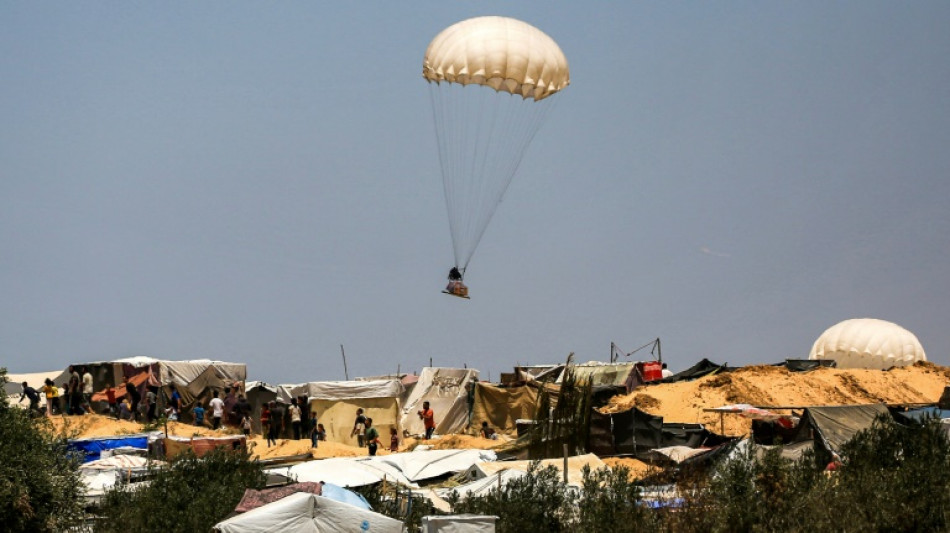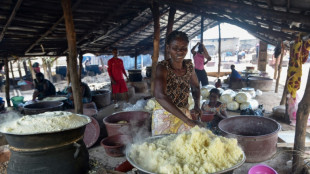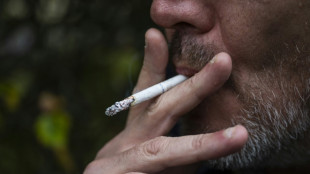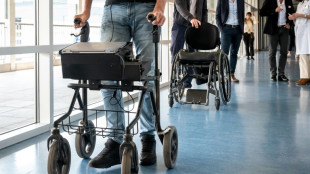
-
 South Korea president clings to power after martial law U-turn
South Korea president clings to power after martial law U-turn
-
Presidential vote seen as referendum on Romania's European future

-
 Hamilton bids farewell to Mercedes as Ferrari vie for title
Hamilton bids farewell to Mercedes as Ferrari vie for title
-
New Zealand unchanged in bid to hit back against England

-
 Macron seeks remedy to France's political crisis
Macron seeks remedy to France's political crisis
-
New Natalia Lafourcade album celebrates music's onstage evolutions

-
 Taiwan's Lai kicks off visit to US territory Guam
Taiwan's Lai kicks off visit to US territory Guam
-
Ivory Coast staple cassava meal gains UNESCO heritage status

-
 OpenAI to partner with military defense tech company
OpenAI to partner with military defense tech company
-
Liverpool held but Slot salutes 'special' Salah

-
 Man City needed to break losing 'routine', says Guardiola
Man City needed to break losing 'routine', says Guardiola
-
Leipzig down Frankfurt to reach German Cup quarters, Cologne strike late

-
 Mbappe admits penalty miss 'big mistake' as Bilbao beat Real Madrid
Mbappe admits penalty miss 'big mistake' as Bilbao beat Real Madrid
-
'Sad, disappointed' Mbappe pays penalty as Bilbao beat Real Madrid

-
 US stocks surge to records, shrugging off upheaval in South Korea, France
US stocks surge to records, shrugging off upheaval in South Korea, France
-
Liverpool held in Newcastle thriller, Arsenal inflict Amorim's first defeat

-
 Shiffrin confirms she'll miss Beaver Creek World Cup races
Shiffrin confirms she'll miss Beaver Creek World Cup races
-
Corner kings Arsenal beat Man Utd to close gap on Liverpool

-
 Mbappe pays penalty as Bilbao beat Real Madrid
Mbappe pays penalty as Bilbao beat Real Madrid
-
NFL Jaguars place Lawrence on injured reserve with concussion

-
 North Korea, Russia defence treaty comes into force
North Korea, Russia defence treaty comes into force
-
Openda hits brace as Leipzig beat Frankfurt in German Cup last 16

-
 Schar punishes Kelleher blunder as Newcastle hold Liverpool in thriller
Schar punishes Kelleher blunder as Newcastle hold Liverpool in thriller
-
De Bruyne masterclass helps Man City end seven-game winless streak

-
 Syrian rebels surround Hama 'from three sides', monitor says
Syrian rebels surround Hama 'from three sides', monitor says
-
Lawyers seek leniency for France rape trial defendants, blaming 'wolf' husband

-
 OpenAI chief 'believes' Musk will not abuse government power
OpenAI chief 'believes' Musk will not abuse government power
-
Thousands rally in Georgia after police raid opposition offices

-
 S. Korea opposition push to impeach president
S. Korea opposition push to impeach president
-
Powell 'not concerned' US Fed would lose independence under Trump

-
 French government falls in historic no-confidence vote
French government falls in historic no-confidence vote
-
Syrian White Helmets chief 'dreams' of never pulling a body out of rubble again

-
 NBA Suns lose Durant for at least a week with ankle injury
NBA Suns lose Durant for at least a week with ankle injury
-
Warhammer maker Games Workshop enters London's top stocks index

-
 Iran Nobel winner released for three weeks, 'unconditional' freedom urged
Iran Nobel winner released for three weeks, 'unconditional' freedom urged
-
Red Cross marks record numbers of humanitarians killed in 2024

-
 Johnson's Grand Slam 'no threat', says World Athletics boss Coe
Johnson's Grand Slam 'no threat', says World Athletics boss Coe
-
Qatar's emir and UK's Starmer talk trade as state visit ends

-
 Cuba suffers third nationwide blackout in two months
Cuba suffers third nationwide blackout in two months
-
Russia, Ukraine to send top diplomats to OSCE summit in Malta

-
 Spanish royals to attend memorial service for flood victims
Spanish royals to attend memorial service for flood victims
-
LPGA, USGA new policy requires female at birth or pre-puberty change

-
 Stick to current climate change laws, US tells top UN court
Stick to current climate change laws, US tells top UN court
-
British Museum chief says Marbles deal with Greece 'some distance' away

-
 Pope Francis receives electric popemobile from Mercedes
Pope Francis receives electric popemobile from Mercedes
-
Gaza civil defence: thousands flee Israeli strikes, evacuation calls

-
 Trump names billionaire private astronaut as next NASA chief
Trump names billionaire private astronaut as next NASA chief
-
Pidcock to leave INEOS Grenadiers at end of season

-
 Seoul stocks weaken, Paris advances despite political turmoil
Seoul stocks weaken, Paris advances despite political turmoil
-
South America summit hopes to seal 'historic' trade deal with EU


Some Gazans 'drinking sewage water': WHO regional chief
Some Gazans are now reduced to drinking sewage water and eating animal feed, the WHO's regional chief said Tuesday, pleading for increased aid access immediately to the besieged territory.
Hanan Balkhy, the World Health Organization's Eastern Mediterranean regional director, also warned that the war between Israel and Hamas had a knock-on impact on healthcare across the wider region.
And the impact on children will have severe lasting effects, the child health expert told AFP in an interview at the WHO headquarters in Geneva.
Inside Gaza, "there are people who are now eating animal food, eating grass, they're drinking sewage water," she said.
"Children are barely able to eat, while the trucks are standing outside of Rafah."
The bloodiest-ever Gaza war was sparked by Hamas's October 7 attack, which resulted in the deaths of 1,194 people, mostly civilians, according to an AFP tally based on Israeli official figures.
Israel's retaliatory bombardment and ground offensive have killed at least 36,655 people in Gaza, also mostly civilians, according to the Hamas-run territory's health ministry.
- 'Extremely complex traumas' -
The UN has long warned that famine is looming in Gaza, with 1.1 million people -- around half of the population -- facing catastrophic levels of food insecurity.
The UN humanitarian agency OCHA on Tuesday said access constraints "continue to undermine the safe delivery of life-saving humanitarian assistance throughout Gaza", and conditions "further deteriorated" in May.
A trickle of aid goes in mainly through the Kerem Shalom crossing with Israel.
The insecurity linked to the fighting and bombings, and roads often filled with debris, also hinders the distribution of aid.
Balkhy, who took office in February, said Gaza needed "peace, peace, peace", plus vastly increased aid-access by land.
After a recent visit to the Rafah crossing from Egypt into the southern Gaza Strip -- a vital conduit for aid that was closed by Israeli forces early last month -- she urged Israel to "open those borders".
Balkhy said Kerem Shalom was "not enough", and the frantic efforts at maritime corridors and air drops made little sense when far less costly and more effective land routes already existed and "the trucks are lined up" outside them.
Balkhy voiced particular frustration at the blocking of medical equipment deemed "dual use" -- items that Israel says could be used for military purposes.
"We're talking about ventilators, purification chemicals to clean water," the Saudi doctor said.
- Child mental health impact -
Balkhy stressed the dire needs of patients in Gaza, with as many as 11,000 critically ill and wounded people requiring medical evacuation.
"The patients that are coming out are showing some extremely complex traumas: compound fractures, multi-drug resistant organisms, very maimed children," she said.
"To rehabilitate people like this and treat them you need very complex health care," Balkhy said, emphasising the knock-on strain on fragile health systems in neighbouring host countries, notably Egypt.
Last week, WHO warned there has been an "abrupt halt" to medical evacuations since Israel launched its offensive in Rafah in early May, warning more people would die while waiting for care.
An infectious disease paediatrician, Balkhy spoke of the short- and long-term impacts of the conflict on children.
She said the war had had a devastating toll on basic public health measures, such as clean water, healthy food and routine immunisations, leaving children susceptible to measles, chicken pox, diarrhoea and respiratory illnesses.
"It's going to have a huge impact on mental health. It's going to cause huge post-traumatic stress syndromes," she warned.
"I think (for) children who have heard the fire and the destruction, and lived it, it's going to take a lot of effort to pull them out."
Regarding children rescued from the rubble, "I don't even know how you recover from that psychologically", she said.
As for the prospect of rebuilding Gaza's shattered health system one day, Balkhy said "the ambition from donors is high.
"But without peace it's impossible."
G.Schulte--BTB




